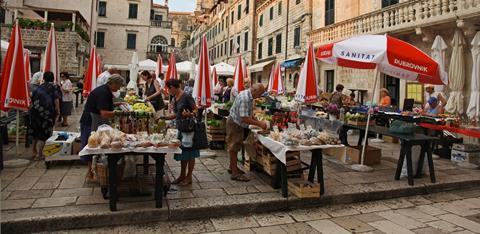
Croatia has officially become the 28th member of the European Union, opening a market of around 5m consumers to fresh produce suppliers in other member states while also formalising existing tariff-free trade channels for Croatia's own fruit and vegetable exports to EU countries.
But while the removal of customs barriers is generally seen as a positive step, particularly for Croatia's clementine sector, concerns have been raised that the country's fresh produce will be unable to compete in the EU marketplace.
'Amateur fruit growers have no perspective, a large part of our fruit production will not stand a chance from foreign competition when we enter the EU,' Stanko Ćosić-Dragan of Agrofructus commented at a recent symposium.
During the 1980s, as part of the former Yugloslavia, Croatia's fresh fruit exports were apparently worth around €350m, but nowadays that figure stands in stark contrast to the reported €170m spent by the country on imported fruit.
'It is absurd, but true,' said Frane Ivkovic, head of the Croatian Fruit-growers Association (HVZ) at the meeting. 'Local fruit production today can only meet 50-60 per cent of Croatia's needs.'
According to HVZ, Croatia produces just one fruit crop – around 35,000 tonnes of mandarins – that is sufficient to sustain an export programme.
Ivkovic said he felt Croatian fruit growers would not be able to recover and compete with competing suppliers across the EU unless there significant investments were made.
'Without new plantations, new fruit varieties, modern technology, modernisation, education and fruit growers uniting, it is hard to expect the domestic fruit industry to have any long-term economic power.
Chain reaction
One company that does appear to have overcome the limitations of Croatia's fresh produce industry is Zagreb-based Fragaria, a key supplier of products including berries and apples to markets in the north of Europe.
In an interview published in the July 2013 issue of Eurofruit, he company's vice-president Stanko Barbarić said he saw good opportunities for Croatian fruit associated with joining the EU.
'For sure, after joining Croatia will be much more interesting to EU customers,' he told Eurofruit. 'I hope we will find a way to benefit from that change, especially for products such as satsuma tangerines, strawberries, apples, plums and leafy vegetables. Our geographic position and climate will give us some advantages.'
However, he did note that domestic products might face even greater competition on their own doorstep.
'Potentially, a big problem is that over 60 per cent of Croatia’s retail market share is owned by Austrian and German supermarket chains,' he said. 'They already have supply chains set up in Austria and there is the possibility that they could simply extend these supply chains into Croatia – Zagreb is less than two hours’ drive from Austria.'
Total grocery spending in Croatia is forecast to reach €7.83m this year, up from €7.64m in 2012 but below the five-year average.
According to Planet Retail, supermarkets and neighbourhood stores remain the leading food retail formats, but discounters are also likely to gain market share over the coming years.
Croatia has been in recession for four years and unemployment is currently around 20 per cent.
With per-capita gross domestic product 39 per cent below the EU average, the prospects for growth are by no means clear.
Additional reporting by Tobias Gourlay



